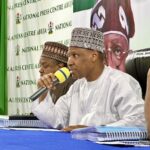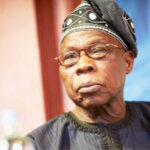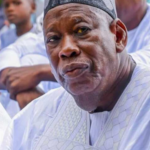Top Igbo leaders, including politicians, retired military personnel, traditional rulers, business moguls, among others, on Saturday, Dec. 11, converged on the Eze Imo palace in Owerri, Imo State, where they brainstormed on the Igbo question in the Nigerian project.
The leaders, who came together during the presentation of a book titled, “Reflections on the Igbo Question,” authored by the Imo State governor, Senator Hope Uzodinma, reflected on the plight of the people of the South-East geopolitical zone in the country.
Daily Trust Saturday reports that the event came at a time the agitation for the rotation of the presidency from North to South was dominating political discourse as the second term of President Muhammadu Buhari elapses in May 2023.
The two main political parties – the All Progressives Congress (APC) and Peoples Democratic Party (PDP) are yet to zone their presidential seats. Regional leaders, presidential aspirants and their supporters are all out to ensure that the presidency is zoned to their area.
Setting the tone for the discussion, a former Chief of Army Staff, Lieutenant- General Azubuike Ihejirika (retd), who chaired the occasion, said there was no lexicon that triggered harsh debate among political leaders across all the geopolitical zones than the issues of marginalisation, restructuring, Igbo presidency and the unity of Nigeria.
He said his experience over the years had shown that Nigeria’s greatest weapon as a country lied in its unity, which is further enhanced by its diverse culture, population and rich history.
“My opinion is that the feeling of marginalisation is not peculiar to the Igbo race; it is a national cry. It must, therefore, not be seen as a basis for separatist agitation.
“I am, therefore, in agreement with the author that these innate desires of our people are better channelled to positive expressions, such as technological advancement, industrialisation and entrepreneurship development, which are globally recognised as key strengths of Ndigbo,” he said.
While preaching against violence in the region and across the country, the retired army chief said the agitation for the Igbo presidency would only be realised through what he called, ‘strategic alliance.’
“ Our continuous desire for an Igbo president, or rather president of Igbo extraction, is a just and inalienable right, but it can only be realised through a strategic alliance with other zones and not by any hostile agitation as emphasised in this book,” he said.
Talking about the book, he said, “In truth, I share most of the views expressed by the author, based on my understanding of Nigeria’s political landscape, having served close to 39 years in the military.
“His viewpoint on the critical issues of Igbo marginalisation and restructuring as documented in the book flows from his wealth of experience in public service over the years, and thus, make this book a must-read for all Nigerians.
“As one of the prominent leaders of the South-East, he has been an advocate of fairness, equity and justice as a basis for the Igbo drive in a united Nigeria.”
Reflecting on the Igbo question, a former governor in of Imo State, Ikedi Ohakim, said Nigerians, irrespective of their geopolitical zones, needed what he tagged JEF – Justice, Equity and Fairness.
“Presidency is not everything. Those who have been occupying the presidency for 35 years, where are they and what have they done with it? The book is a reflection on the Igbo question, not on the Nigeria or Africa question,” Ohakim said.
In their speeches, a former Senate president, Ken Nnamani, and the president of Ohanaeze Ndi Igbo, Professor George Obiozor, also spoke on the plight of the Igbo in the Nigerian project and commended the governor for authoring the book.
Specifically, Obiozor said, “Violence is not in Igbo character, combativeness is not in our character; the Igbo prefer to make friends, and that is why they are everywhere. Is this not true?” He asked and all present applauded him.
Addressing the gathering, Governor Uzodinma called for the reinvention of a model of democracy that would offer each federating unit a holistic sense of belonging, seasoned by equality, justice and the rule of law.
“This task is urgent because it seems obvious that the original federal project secured by our founding fathers has fallen apart,” he said.
For his fellow Igbo, the governor said, “The challenge of our generation is to insist on our inalienable birthright as citizens of Nigeria, who must coexist with other ethnic nationalities as equal partners. This is the rationale for my book that has just been presented to you. It is my own modest contribution on how the Igbo can overcome the existential challenges facing them today in the project, Nigeria.
“One thing stands clear here, and it is the consistency of my views on the subject matter, which were expressed before I became the governor of Imo State. These views can be aptly summarized in two themes, to wit: the Igbo have not had a fair deal from the project, Nigeria since the end of the civil war.
“They have continued to cry to high heavens over the sordid dilemma they face in their own country. I believe we have cried enough and it is time to wipe our tears. The second is that the Igbo are citizens of Nigeria by birth. They should never allow themselves to be cajoled out of their father’s land and inheritance. This is our country and we must stay here and collectively enforce our rights as bona fide citizens of Nigeria.”
Suggesting the way forward, the governor said the Igbo needed to reclaim their rightful place in Nigeria by building on their comparative advantage over other Nigerians.
“I have painstakingly explained the way forward in this book. We need to reclaim our rightful place in Nigeria by building on the comparative advantage we have over other Nigerians.
“We have to leverage on the special talents bestowed on us by God to ensure that we are accorded our dues in Nigeria; one of the talents is technology, the other is commerce and trade. Currently, the evidence is there that it was helpful to us in the past and is still at our disposal today.
“If the truth be told, we are dominating in commerce and trade in Nigeria. But we can do far better than that as a people if we put our thinking caps on,” he added.
The Imo governor said that when the Jews found themselves in a similar situation such as the Igbo of Nigeria, they simply used their talents to force the world to accede to their legitimate demand.
“Through technology and the media, the Jews now call the shots in major countries of the world, including the United States of America.
“That is the challenge before my people, the Igbo. We already have a country, we don’t need another one. We should rise and take our rightful place by unleashing our God-given talents and working in concert and being focused on the future, which I believe holds a lot of promise,” he said.
5 steps to actualising Igbo presidency – Uzodinma
In his book, the Imo governor enumerated five steps to actualising the president of Igbo extraction. First, he urged Igbo leaders to embrace what he tagged, “Vision Refocusing.”
“We urgently need to adopt the right navigational tools that can take us to the desired destination. The first thing to do here is to purge ourselves of the fixation or illusion of the Igbo presidency because this can never be actualised.
“We must appreciate the inevitability of the fact that while the president of Nigeria of Igbo extraction is achievable, Igbo presidency is not,” he said, stressing that the concept of Igbo presidency smacks of bigotry and sectionalism.
Secondly, the governor advocated a pan-Nigeria approach, urging Igbo leaders to embrace other Nigerians and show a greater patriotic stake in the Nigerian project.
“As we speak, a babble of voices across the country is pushing hard for separatist ideologies. What is our take on this? Do we want to rule a united or fragmented Nigeria at the verge of disintegration? I want to believe that our love as a people for Nigeria is not in doubt,” he said.
On the third step, the governor said the Igbo political class must move to a national party, saying, “Those who delude you that the way to a Nigerian president of Igbo extraction will come from a clannish political party are false prophets and prophets of doom.”
On the fourth step, Uzodinma called for the renaissance of the Igbo spirit of excellence and industry.
“You very well know the age-log saying that there are many ways to kill a rat. As Igbo, we must put on our thinking caps and realise fast enough that no successful General ever sets out for war with only one dominating the world of excellence,” he said.
The last step, according to the governor, was agenda-setting, think-tank and global networking.
“As a people, we must strive to set up a central agenda and think-tank. This can be embedded into the Ohanaeze forum and funded properly by South-East governments and private individuals or corporations.
“The job of the think-tank should be to constantly carry out research on areas that can further Igbo interest and to set agenda therefrom, for the future,” he said.

 Join Daily Trust WhatsApp Community For Quick Access To News and Happenings Around You.
Join Daily Trust WhatsApp Community For Quick Access To News and Happenings Around You.


